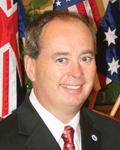Let’s start with a brief introduction. What is your position at AIFS and what has been your career path so far?

Paul Watson: My position is Senior Vice President and Executive Director of AIFS Study Abroad. I have been in this position for almost six years. Prior to coming to AIFS for 18 years I was Director of Enrollment Management at the Institute for Shipboard Education, which operates the Semester at Sea program. I began my career working at the University of Pittsburgh in Student Registration and Financial Services. So, my career has been exclusively in higher education, and obviously international education/study abroad.
Did you study abroad? If so, where and what impact did this have on your personal and/or professional development?
Paul: I did. I studied abroad for a year in Kobe, Japan. It had a profound impact on my personal and professional development. It was no doubt the most academically rewarding experience of my undergraduate education, and it led me to ultimately choose international higher education as a career. I went there to study Japanese language and business, thinking it would lead to me to international banking or business of some kind, but I quickly realized how much I enjoyed being involved in higher education.
AIFS was founded in 1964 making it one of the oldest study abroad organizations in the world. How has AIFS evolved from its early beginnings and how do you stay relevant in an increasingly competitive industry?
Paul: Having only been part of AIFS for a short period in its history I have not witnessed first hand its evolution. However, I think the organization first and foremost has stayed true to its core principles: To offer the highest quality academic and experiential programs, proving students with everything they need in order to maximize the learning opportunity that study abroad affords. AIFS has continued to offer strong programming in the traditional study abroad destinations, while at the same time have expanded program offerings to meet the needs of students looking to opportunities outside the more traditional locations. I believe we have sought to meet the changing needs of our partner institutions in the US who are very involved in the administration of study abroad on their respective campuses.
At Go Overseas we’re all about reviews. On what basis do you think study abroad programs should be assessed to properly reflect their overall value?
Paul: Not an easy question. There are many things that can be considered. Being tried and true – having a long history of successful delivery of study abroad programming, should be considered. Wide acceptance by colleges and universities is a factor as well. AIFS has over 300 affiliated institutions and additionally receive students from many more schools. The reputation of an organizations partners abroad and the quality of the programs offered are important. Experience and level of service provided by on site staff (Resident Directors) is key. Student satisfaction; parent satisfaction; What is included in the program/fee are valid metrics. Price can be misleading. A lower priced program may not actually turn out to be a lower cost program for the student depending on what out of pocket expenses they have to incur. The level and quality of support that is provided to students applying to and preparing for study abroad is a factor as well.
What do students look for in a study abroad program these days and how does AIFS address these needs?
Paul: Students have diverse interests and needs and not all are looking for the same thing. We focus on high quality academic experiences; all inclusive programming; high level student/customer support; health and safety.
How many students does AIFS send abroad each year? Which destination is the most popular?
Paul: Upwards of 5000 including our customized, faculty-led programming. Europe continues to draw the most with Italy and the UK attracting larger groups than other destinations. However, programs in Russia, Czech Republic, South Africa and India, among others, which offer something a little different, are growing as well.
What does the future hold for AIFS?
Paul: We will continue to look for new opportunities destinations and academic programming that help to draw students from diverse interests and majors to study abroad. Hopefully study abroad will continue to grow. It remains the exception rather than the norm with only a small percentage of students deciding to include a study abroad experience as a part of their undergraduate education. In an increasingly interdependent world, students need to have the skills to thrive in a global environment. Study abroad is one way to help develop those skills.
Famous last words?
Paul: Not mine, but attributed to Mark Twain. As I said above, study abroad is one of the things that many students intend to do but for myriad reasons most ultimately do not.
Twenty years from now you will be more disappointed by the things you didn’t do than by the ones you did. So throw off the bowlines, sail away from the safe harbor. Catch the trade winds in your sails. Explore, Dream, Discover.
In my view, there will never be a better time for a young person to experience the world, and study abroad will have a lasting and often life-changing impact.